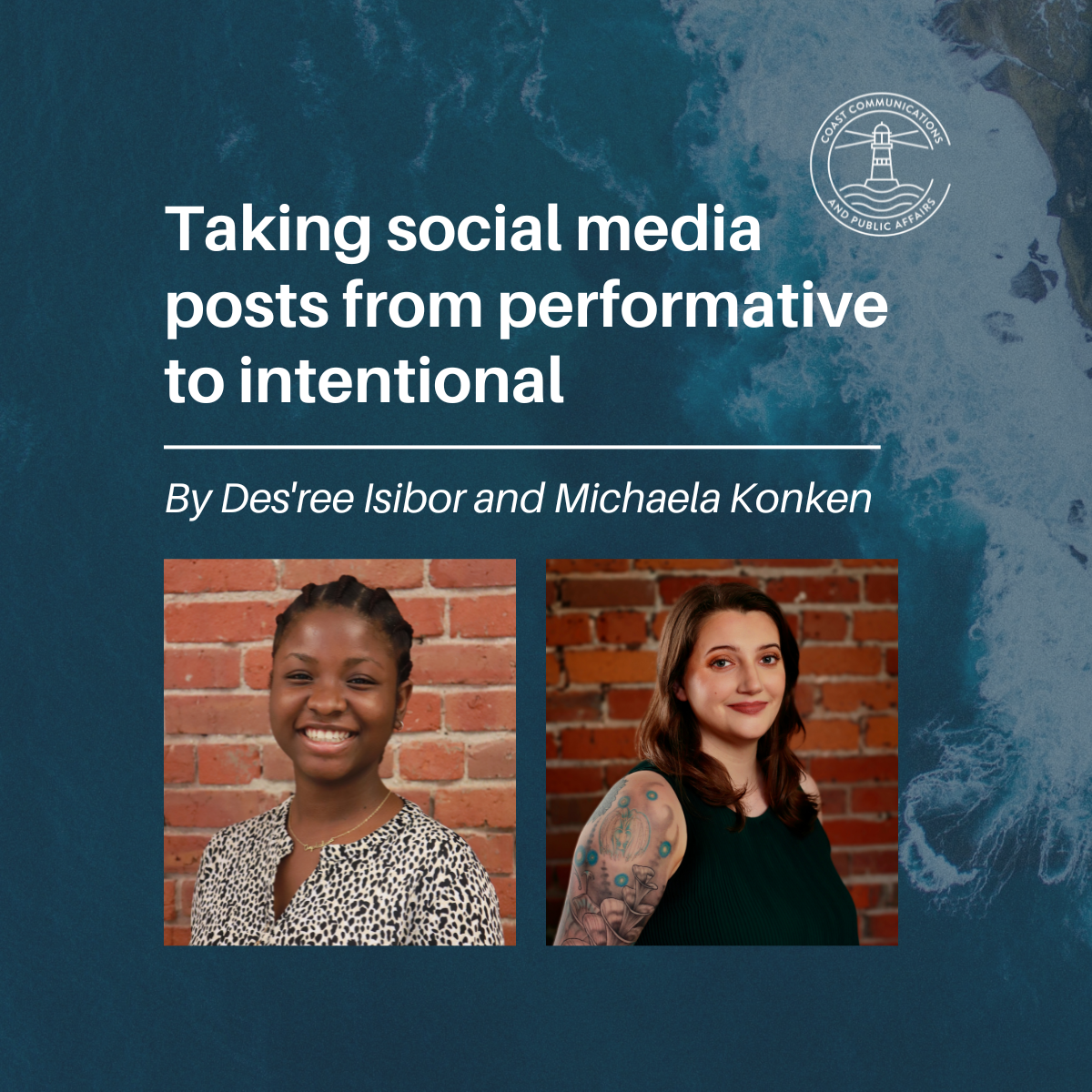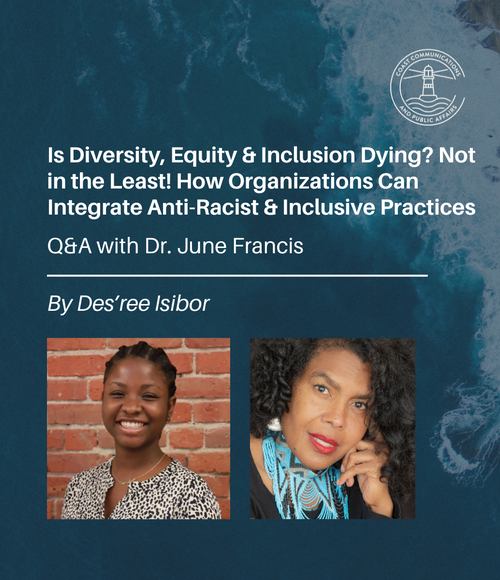We’ve all seen purely performative social media posts from companies and organizations. You know the ones… the rainbow-coloured logo of a company that never actually supports the LGBTQ2A+ community outside of Pride. Or the company calls to action to read more Black authors (but only issued during Black History Month). It’s also not news that marginalized communities are calling on organizations to stop being performative and support them all year.
On the other hand, there are communications professionals who want to avoid these kinds of performative posts altogether and post either nothing at all or a meaningless and simple acknowledgment of the day/month. At Coast Communications and Public Affairs, we’ve been guilty of the avoid option, but we will try and do better, and here’s why you should too.
Playing the long game to help make society better overall
A key part of a change is to consider why you do it — ensure you are intentional and purposeful with the posts. It’s about playing the long game. Think about all the little kids out there seeing themselves and others represented publicly by organizations. Normalizing our differences and bringing positive awareness to marginalized communities is essential and makes the world a much better place. Broader and diverse representation in our lives and the media we consume helps shape our worldview for the better.
When developing content or campaigns for these themed celebrations, strive to create evergreen content that can remain relevant months after ‘no one is talking about it.’ Instead of viewing campaigns on a short-term basis as a slot on your editorial calendar, think big-picture and what role your organization plays, or can play, in the grand scheme of things. Recognize that your content can make a positive difference — whether that means spotlighting the great work of the specific marginalized communities or taking the initiative to correct distorted perceptions.
Align your actions with your posts
PR campaigns become performative when an organization only intends to show allyship or support for marginalized communities outwardly.
As a Black woman who has only lived in Canada for four years, Des’ree believes genuine actions and campaigns stem from asking tough questions. “Beyond your social media posts, how else is your organization doing things differently? Behind closed doors, what actions are being made to bring diversity and inclusion to the forefront? If it were not #BHM, would your content still address inequities Black people face?”
Black History Month, National Day for Truth and Reconciliation and Pride Month are not just events on your editorial calendar. They should present opportunities for leaders and employees to reflect and create meaningful ways to change false narratives and introduce better-informed perspectives.
At Coast Communications and Public Affairs, we are interested in serving First Nations governments, providing them with communications support, from crisis comms to event planning. But we are also committed to capacity building, so we tell clients up front — that we want to do things differently and don’t want to be around forever. We want you to take the reins when you are ready. Reconciliation is about sharing our knowledge and experience, not gatekeeping. It’s not about posting on key dates.
Ask yourself: do the campaigns stand to benefit only your organization (and its image), or do they genuinely amplify the voices and interests of marginalized communities? Do your values and actions in the organization align? Being intentional may look different for each organization. It may require your content strategy to undertake an empathetic lens by engaging with various individuals and groups, enlightening your audience about unspoken truths, and sharing the not-so-glamorous history of marginalized peoples and available resources.
Pro-Tip: If possible, involve a member of the marginalized community to avoid putting out insensitive and tone-deaf content. Even better, try hiring a diverse team members with different perspectives.
Start a conversation. Show real commitment all-year round. A themed logo and aesthetic social media graphic are the bare minimum.
Lift up others
This isn’t the time to try to become an ‘expert’ on a community you don’t belong to. As a white, cis-gendered woman, Michaela recognizes her role in shining a light on others. “When writing awareness day posts, it’s the time to showcase organizations and individuals doing the good, tough and necessary work to support marginalized groups and direct followers to the resources they provide,” explains Michaela.
Sharing resources and uplifting other voices is a great and purposeful alternative to trying to make a profit or score points from performative actions, such as buying and wearing “Orange Shirt Day” apparel that does nothing to support Indigenous communities.
Since there is an expectation from the public that organizations do ‘performative’ social posts, it serves you well to leverage this to lift up other organizations and share resources while they’re at it that can help others learn.
Not sure how to start? Here are some examples.
Ben & Jerry’s Ice Cream has long been a supporter of the LGBTQ2A+ community and even has a webpage dedicated to explaining how they do business to support marginalized groups and the environment.
We know not everyone has the ability (or budget power) to make changes that lead to big organizational commitments. The BC Centre for Women in the Trades’ Canada Day post which shared Idle No More’s event and a link to Indigenous Tourism BC’s events is a good example of how you can spark a conversation amongst your audience.
TL;DR
Don’t shy away from creating social posts on awareness days and months. You’re not an expert — and no one expects you to be — but a bit of effort and intention goes a long way. This is your (and your organization’s) chance to help make our world more beautiful for current and future generations.
Are you looking to improve your organization’s social media content? The Coast Comms team has the experience to help you go from performative to intentional with your social media strategy. Contact us at info@coastcomms.ca to get started.



